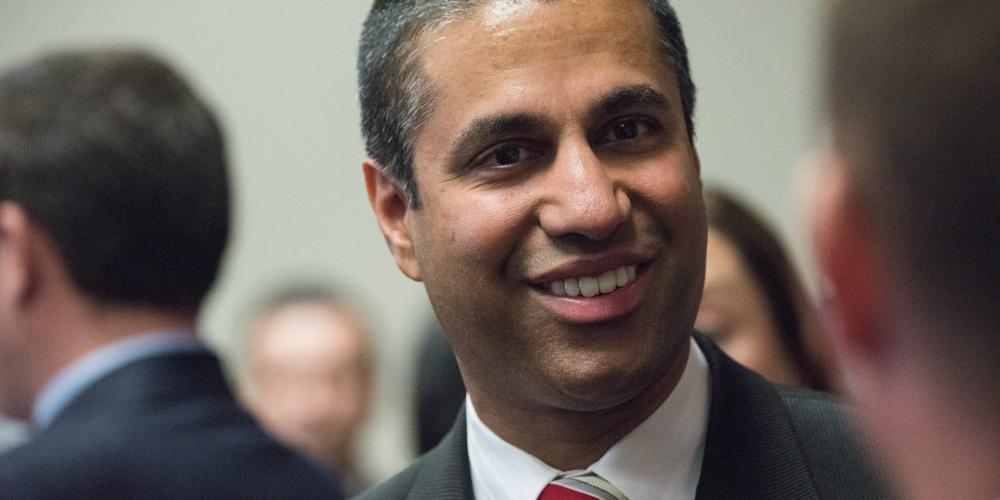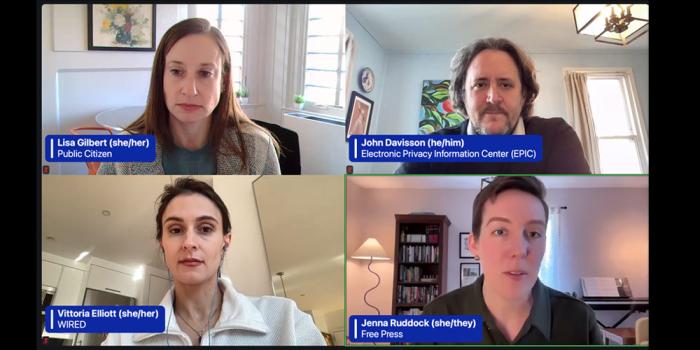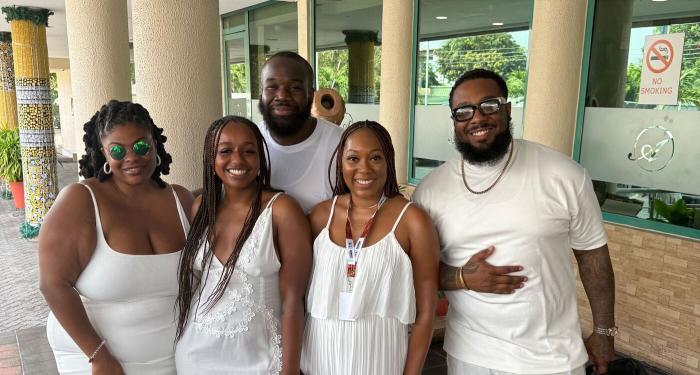How the Trump FCC Is Disconnecting the Poor

The Federal Communications Commission is catering to corporations and harming the very people it’s supposed to serve.
Last Thursday, the Voices for Internet Freedom coalition hosted a briefing for members of Congress and their staff about the disastrous policies the FCC is moving forward that would make it harder for poor people to access vital communications services.
Speakers condemn the FCC’s cruel actions
The FCC’s War on the Poor briefing brought together affected communities, advocates and policy experts for a panel discussion about the FCC’s proposal to roll back the Lifeline program, the vote to undo Title II Net Neutrality, and the agency’s refusal to stand up to predatory prison-phone companies. All of these actions have a disproportionate impact on communities of color and people living below the poverty line.
Before the panel began, FCC Commissioners Mignon Clyburn and Jessica Rosenworcel and Reps. Gwen Moore and Maxine Waters spoke.
Commissioner Rosenworcel talked about how the “the future belongs to the connected,” and so we must oppose any policy that would make it even more difficult for people to connect and communicate. She noted that FCC Chairman Ajit Pai’s proposal to dismantle Lifeline would rob poor people of affordable phone and internet access, which would be especially harmful to people of color, seniors, veterans and people with disabilities.
Disconnecting vulnerable communities
Panelist Rudy Gallardo, a former Lifeline subscriber from Fresno, California, talked about how kids in his community have to stay inside for recess to do their homework because their families can’t afford internet at home. The FCC's plan to gut the Lifeline program would make it even harder for people to get online.
Chairman Pai has spent the last year talking about how the FCC will finally close the digital divide, but the plan to destroy Lifeline would take away affordable broadband internet access from millions of people. On top of being heartless, this plan is senseless: No one is asking for it — not even internet service providers.
Getting rid of Lifeline is just one of the ways that Chairman Pai and the FCC’s Republican majority are leaving poor people and communities of color behind. Under Pai’s leadership, the FCC has refused to stand up for incarcerated people and their families, who are being gouged by predatory prison-phone companies.
Telecom companies routinely charge exorbitant rates for phone calls in and out of prisons, sometimes charging up to $24.95 for a 15-minute phone call.
In 2013, under interim FCC Chairwoman Clyburn — the first woman, and the first Black woman, to run the agency — the FCC voted to protect incarcerated people and their families from being exploited by these predatory phone companies, but Pai refused to defend these critical protections in court.
This has left millions of families — including the children of incarcerated people — with no realistic means of staying connected.
Panelist Lillian Tillman, a mother and prison-phone justice activist, talked about how she’s had to decide between putting food on the table and talking to her son, who is incarcerated. She’s spent a couple thousand dollars trying to maintain contact with him over the past year.
Under Chairman Pai, the FCC has refused to protect the people it’s supposed to serve. And when it comes to prison-phone companies, Pai has a shady past. Before his appointment to the FCC, Pai represented one of the prison-phone companies known for taking advantage of incarcerated people: Securus Technologies.
Destroying the open internet
Also suspect is the policy that Pai’s been championing since before he became chairman: destroying Title II Net Neutrality.
Pai used to be a lawyer for Verizon, one of the most anti-Net Neutrality ISPs in the country. As soon as Pai took over the Commission, he moved forward with his plan to allow companies like Verizon to block, throttle and censor online communication — handing control of the internet to corporations.
Last December — ignoring the outcry from millions of people — the FCC’s Republican majority voted to destroy the Net Neutrality rules.
If corporations control the internet, they control the most important communication and organizing tool of our time — and they could use this to censor political speech and crush movements for racial, gender and economic justice, and charge even more for something that too many people already can’t afford.
Fighting back
Chairman Pai is waging a war on the poor to further his political and corporate agenda. With the FCC split along party lines — three commissioners are Republicans and two are Democrats — Pai has the upper hand. But Congress can still step in to protect everyone the FCC chairman and his Republican colleagues have abandoned.
Speakers and panelists at the War on the Poor briefing called on members of Congress to:
- Voice their opposition to the plan to roll back Lifeline, and leave millions without affordable internet access.
- Support bipartisan legislation introduced by Sens. Tammy Duckworth, Cory Booker, Rob Portman and Brian Schatz that would force the FCC to stand up for families being exploited by prison-phone companies’ predatory practices.
- Sign on to the congressional effort to overturn the FCC’s bad Net Neutrality vote and restore the Title II Net Neutrality protections.
The FCC chairman and the Republican majority have been axing our communications rights for the past year. And those who will suffer the most from their policies are people living below the poverty line and people of color.
It’s our job to intervene and make sure that — instead of being thrown to the wolves — vulnerable communities are centered in the policies that dictate how we communicate with one another. We must work together to stop the FCC's war on the poor.




